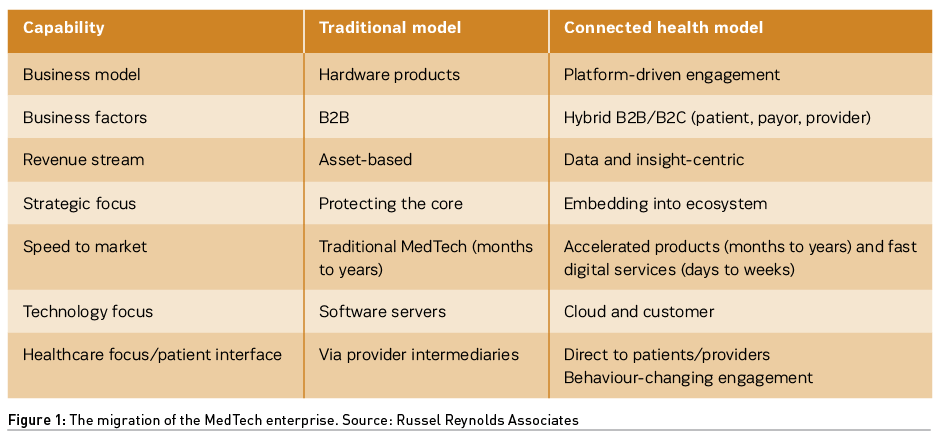HealthManagement, Volume 22 - Issue 3, 2022
Key Points
- Digitisation is in full swing for the medical device industry and will continue to disrupt the sector throughout the 2020s.
- This has created a need for board directors and leadership teams that are equipped to tackle not just the new technology and innovation, but also changes in business models, types of talent and company culture.
- Organisations need to revisit their talent management strategy.
- Individuals will not be able to drive the digital transformation alone – it needs to be an organisation-wide push with dedication and enthusiasm driven from the top by the board and C-suite.
Accelerated by the COVID-19 crisis, digitisation is in full swing for the medical device industry and will continue to disrupt the sector throughout the 2020s. As Jim Hollingshead, President, Sleep & Respiratory Care Business at ResMed stated in an interview with Russell Reynolds Associates (RRA), “We went from being a medical device-only company to being a medical device plus software plus analytics company”.
This has created a need for board directors and leadership teams that are equipped to tackle not just the new technology and innovation, but also changes in business models, types of talent and company culture. In order to be successful, organisations must identify tech-savvy leaders that can navigate this rapidly transforming environment with its new competitors, stakeholders and possibilities around connected care (Figure 1).
Attracting as well as retaining strong technology talent has proven to be difficult. In an interview with RRA, Sue Siegel, Board Member at Align, Illumina and Nevro described it as an “incredible rush to compete with the tech world to hire some of the most technically-savvy talent: engineers, data scientists, AI/ML experts, to mention a few. The scramble to find that type of talent is real.” Organisations need to revisit their talent management strategy, which includes demonstrating a commitment to digital transformation both internally and externally, placing a greater value on external technology talent and establishing fitting recognition and career opportunities for current and new tech-savvy leaders.
For an organisation to reach its digital ambitions in a timely matter, it cannot only focus on attracting talent that will support the organisation’s organic growth and transformation. A hybrid strategy that includes organic growth using in-house incubators and cultivation of digital and entrepreneurial talent, inorganic growth through targeted mergers and acquisitions, and an effective ecosystem of partners will be required to reach the organisation’s full potential.
The ability for a company to successfully lead through the ongoing digital transformation will be dependent on the calibre of the leadership team in charge. This calls for a level of awareness around the digital capabilities the current organisation has. It will require leaders to challenge the broader organisation around the culture it is creating as well as the gaps that need to be addressed in terms of digital expertise. Chet Kolley, Group VP, Healthcare and Life Sciences Business at GlobalLogic shared with us: “It’s really become a prominent part of the company strategy: the way they go to market, the way they differentiate themselves, the way they build relationships directly with the people whom they consider their stakeholders with whatever business that they do”. Individuals will not be able to drive the digital transformation alone – it needs to be an organisation-wide push with dedication and enthusiasm driven from the top by the board and C-suite.

To best do so, RRA compiled a list of questions the board and C-suite should be asking themselves in order to best prepare the organisation for the digital disruption that is ahead:
- Do we have a digitally-savvy leadership team to support our digital agenda?
- Do we have capabilities at the C-suite level and within the board to steer the enterprise through the next industry transition into new business models?
- If not, how do we get those capabilities?
- How do we organise ourselves around our digital agenda?
- How do we scale our many digital initiatives or ‘1000 flowers blooming’?
- How do we leverage the groundswell in our organisation?
- Do we need more digitally-savvy board directors?
- Do we need a chief digital/technology officer?
- How do we become a magnet for digital talent?
- Are our next generation of leaders ‘digitally conversant’?
- How do we take advantage of the fact that the next generation of leaders have grown up in a completely digital world?
- Do we have the feedback loops and a mindset in place to ensure the organisation doesn’t ‘tune out’ (and force out) new hires who get it?
- To what extent are we hardwiring comfort with ambiguity into ongoing leadership development programmes?
As digital leadership is increasingly becoming an urgent C-suite priority, successful leadership teams will be those able to ask the difficult questions regarding their own capabilities and actively seek out and grow the ‘digital native’ perspective in their organisations.
Conflict of Interest
None.





